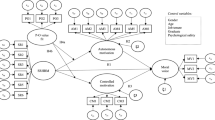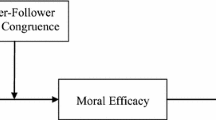Abstract
Although several studies explored the relationship between supervisors’ ethical leadership and employee job satisfaction, little information is available on this relationship in the Chinese context. We propose that moral cognition is an essential process in the relationship between supervisor’s ethical leadership and employee subjective well-being. The present study, through the lens of the social cognitive theory, examined the relationship between supervisors’ ethical leadership and employee job satisfaction, as well as the employee moral-cognitive processes between them. Based on 371 employees in a Chinese enterprise, the present study employed structural equation modeling to examine the hypothesized research model. The results confirmed that supervisors’ ethical leadership was positively related to employee moral awareness, moral identity and job satisfaction, respectively. Moreover, employee moral awareness and moral identity partially mediated the relationship between supervisors’ ethical leadership and employee job satisfaction. The theoretical and managerial implications were further discussed.

Similar content being viewed by others
References
Aquino, K., Freeman, D., Reed, A., Lim, V. K. G., & Felps, W. (2009). Testing a social-cognitive model of moral behavior: The interactive influence of situations and moral identity centrality. Journal of Personality and Social Psychology, 97(1), 123–141.
Aquino, K., McFerran, B., & Laven, M. (2011). Moral identity and the experience of moral elevation in response to acts of uncommon goodness. Journal of Personality and Social Psychology, 100(4), 703–718.
Aquino, K., Reed, A., Thau, S., & Freeman, D. (2007). A grotesque and dark beauty: How moral identity and mechanisms of moral disengagement influence cognitive and emotional reactions to war. Journal of Experimental Social Psychology, 43(3), 385–392.
Arnaud, A. (2010). Conceptualizing and measuring ethical work climate development and validation of the ethical climate index. Business and Society, 49(2), 345–358.
Avey, J. B., Wernsing, T. S., & Palanski, M. E. (2012). Exploring the process of ethical leadership: The mediating role of employee voice and psychological ownership. Journal of Business Ethics, 107(1), 21–34.
Bandura, A. (1986). Social foundations of thought and action. Englewood Cliffs, NJ: Prentice-Hall.
Bandura, A. (1989). Human agency in social cognitive theory. American Psychologist, 44(9), 1175–1184.
Bandura, A. (1991a). Social cognitive theory of self-regulation. Organizational Behavior and Human Decision Processes, 50(2), 248–287.
Bandura, A. (1991b). Social cognitive theory of moral thought and action. Handbook of Moral Behavior and Development, 1, 45–103.
Bandura, A. (2001). Social cognitive theory: An agentic perspective. Annual Review of Psychology, 52(1), 1–26.
Baron, R. M., & Kenny, D. A. (1986). The moderator mediator variable distinction in social psychological-research—conceptual, strategic, and statistical considerations. Journal of Personality and Social Psychology, 51(6), 1173–1182.
BBC. (2010). Lehman Brothers’ former heads criticised for lapses. http://news.bbc.co.uk/2/hi/business/8563604.stm.
Bedi, A., Alpaslan, C., & Green, S. (2015). A meta-analytic review of ethical leadership outcomes and moderators. Journal of Business Ethics, 1–20.
Brislin, R. W. (1980). Translation and content analysis of oral and written materials. In H. C. Triandis & J. W. Berry (Eds.), Handbook of cross-cultural psychology (pp. 389–444). Boston: Allyn and Bacon.
Brown, M. E., & Treviño, L. K. (2006). Ethical leadership: A review and future directions. Leadership Quarterly, 17(6), 595–616.
Brown, M. E., Treviño, L. K., & Harrison, D. A. (2005). Ethical leadership: A social learning perspective for construct development and testing. Organizational Behavior and Human Decision Processes, 97(2), 117–134.
Bryant, P. (2009). Self-regulation and moral awareness among entrepreneurs. Journal of Business Venturing, 24(5), 505–518.
Butterfield, K. D., Treviño, L. K., & Weaver, G. R. (2000). Moral awareness in business organizations: Influences of issue-related and social context factors. Human Relations, 53(7), 981–1018.
Cammann, C., Fichman, M., Jenkins, G. D., & Klesh, J. R. (1983). Assessing the attitudes and perceptions of organizational members. In S. E. Seashore, E. E. Lawler, P. H. Mirvis, & C. Cammann (Eds.), Assessing organizational change: A guide to methods, measures, and practices (pp. 71–138). New York: Wiley.
Chen, Z. X., & Aryee, S. (2007). Delegation and employee work outcomes: An examination of the cultural context of mediating processes in China. Academy of Management Journal, 50(1), 226–238.
Chughtai, A., Byrne, M., & Flood, B. (2015). Linking ethical leadership to employee well-being: The role of trust in supervisor. Journal of Business Ethics, 128(3), 653–663.
Dulac, T., Coyle-Shapiro, J. A. M., Henderson, D. J., & Wayne, S. J. (2008). Not all responses to breach are the same: The interconnection of social exchange and psychological contract processes in organizations. Academy of Management Journal, 51(6), 1079–1098.
Hayes, A. F. (2013). Introduction to mediation, moderation, and conditional process analysis: A regression-based approach. New York City: Guilford Press.
Kalshoven, K., Den Hartog, D. N., & De Hoogh, A. H. B. (2011). Ethical leadership at work questionnaire (ELW): Development and validation of a multidimensional measure. Leadership Quarterly, 22(1), 51–69.
Kalshoven, K., Den Hartog, D. N., & De Hoogh, A. H. B. (2013). Ethical leadership and follower helping and courtesy: Moral awareness and empathic concern as moderators. Applied Psychology: An International Review, 62(2), 211–235.
Leung, K., Smith, P. B., Wang, Z. M., & Sun, H. (1996). Job satisfaction in joint venture hotels in China: An organizational justice analysis. Journal of International Business Studies, 27(5), 947–962.
Li, Y. P., Xu, J., Tu, Y. D., & Lu, X. X. (2014). Ethical leadership and subordinates’ occupational well-being: A multi-level examination in China. Social Indicators Research, 116(3), 823–842.
Lian, H. W., Ferris, D. L., & Brown, D. J. (2012). Does power distance exacerbate or mitigate the effects of abusive supervision? It depends on the outcome. Journal of Applied Psychology, 97(1), 107–123.
Lowry, D. (2003). An investigation of student moral awareness and associated factors in two cohorts of an undergraduate business degree in a British university: Implications for business ethics curriculum design. Journal of Business Ethics, 48(1), 7–19.
Luthans, F. (2002). The need for and meaning of positive organizational behavior. Journal of Organizational Behavior, 23(6), 695–706.
Luthans, F., & Youssef, C. A. (2007). Emerging positive organizational behavior. Journal of Management, 33(3), 321–349.
Martin, G. S., Resick, C. J., Keating, M. A., & Dickson, M. W. (2009). Ethical leadership across cultures: A comparative analysis of German and US perspectives. Business Ethics: A European Review, 18(2), 127–144.
Mayer, D. M., Kuenzi, M., & Greenbaum, R. L. (2010). Examining the link between ethical leadership and employee misconduct: The mediating role of ethical climate. Journal of Business Ethics, 95(1), 7–16.
Mayer, D. M., Kuenzi, M., Greenbaum, R., Bardes, M., & Salvador, R. (2009). How low does ethical leadership flow? Test of a trickle-down model. Organizational Behavior and Human Decision Processes, 108(1), 1–13.
Mayer, D. M., Nurmohamed, S., Treviño, L. K., Shapiro, D. L., & Schminke, M. (2013). Encouraging employees to report unethical conduct internally: It takes a village. Organizational Behavior and Human Decision Processes, 121(1), 89–103.
Neubert, M. J., Carlson, D. S., Kacmar, K. M., Roberts, J. A., & Chonko, L. B. (2009). The virtuous influence of ethical leadership behavior: Evidence from the field. Journal of Business Ethics, 90(2), 157–170.
Ogunfowora, B. (2014). The impact of ethical leadership within the recruitment context: The roles of organizational reputation, applicant personality, and value congruence. Leadership Quarterly, 25(3), 528–543.
Palmer, D. E. (2009). Business leadership: Three levels of ethical analysis. Journal of Business Ethics, 88(3), 525–536.
Piccolo, R. F., Greenbaum, R., Den Hartog, D. N., & Folger, R. (2010). The relationship between ethical leadership and core job characteristics. Journal of Organizational Behavior, 31(2–3), 259–278.
Podsakoff, P. M., MacKenzie, S. B., Lee, J. Y., & Podsakoff, N. P. (2003). Common method biases in behavioral research: A critical review of the literature and recommended remedies. Journal of Applied Psychology, 88(5), 879–903.
Pucic, J. (2015). Do as I say (and do): Ethical leadership through the eyes of lower ranks. Journal of Business Ethics, 129(3), 655–671.
Resick, C. J., Hargis, M. B., Shao, P., & Dust, S. B. (2013). Ethical leadership, moral equity judgments, and discretionary workplace behavior. Human Relations, 66(7), 951–972.
Resick, C. J., Martin, G. S., Keating, M. A., Dickson, M. W., Kwan, H. K., & Peng, C. Y. (2011). What ethical leadership means to me: Asian, American, and European Perspectives. Journal of Business Ethics, 101(3), 435–457.
Reynolds, S. J. (2006). Moral awareness and ethical predispositions: Investigating the role of individual differences in the recognition of moral issues. Journal of Applied Psychology, 91(1), 233–243.
Ruiz, P., Ruiz, C., & Martinez, R. (2011). Improving the “leader–follower” relationship: Top manager or supervisor? The ethical leadership trickle-down effect on follower job response. Journal of Business Ethics, 99(4), 587–608.
Shao, R. D., Aquino, K., & Freeman, D. (2008). Beyond moral reasoning: A review of moral identity research and its implications for business ethics. Business Ethics Quarterly, 18(4), 513–540.
Shi, M., Yan, X., You, X., & Li, J. (2015). Core self-evaluations, emotional intelligence and job satisfaction in Chinese soldiers. Social Indicators Research, 124(1), 221–229.
Shrout, P. E., & Bolger, N. (2002). Mediation in experimental and nonexperimental studies: New procedures and recommendations. Psychological Methods, 7(4), 422–445.
Treviño, L. K. (1986). Ethical decision-making in organizations: A person–situation interactionist model. Academy of Management Review, 11(3), 601–617.
Tu, Y., & Lu, X. (2013). How ethical leadership influence employees’ innovative work behavior: A perspective of intrinsic motivation. Journal of Business Ethics, 116(2), 441–455.
Tu, Y., & Lu, X. (2014). Do ethical leaders give followers the confidence to go the extra mile? The moderating role of intrinsic motivation. Journal of Business Ethics, 1–16.
van Horn, J. E., Taris, T. W., Schaufeli, W. B., & Schreurs, P. J. G. (2004). The structure of occupational well-being: A study among Dutch teachers. Journal of Occupational and Organizational Psychology, 77, 365–375.
Wood, R., & Bandura, A. (1989). Social cognitive theory of organizational management. Academy of Management Review, 14(3), 361–384.
Wu, L. Z., Kwan, H., Yim, F. K., Chiu, R., & He, X. (2015). CEO ethical leadership and corporate social responsibility: A moderated mediation model. Journal of Business Ethics, 130(4), 819–831.
Zhu, W. (2008). The effect of ethical leadership on follower moral identity: The mediating role of psychological empowerment. Leadership Review, 8(3), 62–73.
Zhu, W., Riggio, R. E., Avolio, B. J., & Sosik, J. J. (2011). The effect of leadership on follower moral identity: Does transformational/transactional style make a difference? Journal of Leadership & Organizational Studies, 18(2), 150–163.
Acknowledgments
This study was supported by National Natural Science Foundation of China (No. 71402127), 2014–2015 International Scholar Exchange Fellowship Program of Korea Foundation for Advanced Studies and The Fundamental Research Funds for the Central Universities of China.
Author information
Authors and Affiliations
Corresponding author
Rights and permissions
About this article
Cite this article
Tu, Y., Lu, X. & Yu, Y. Supervisors’ Ethical Leadership and Employee Job Satisfaction: A Social Cognitive Perspective. J Happiness Stud 18, 229–245 (2017). https://doi.org/10.1007/s10902-016-9725-1
Published:
Issue Date:
DOI: https://doi.org/10.1007/s10902-016-9725-1




